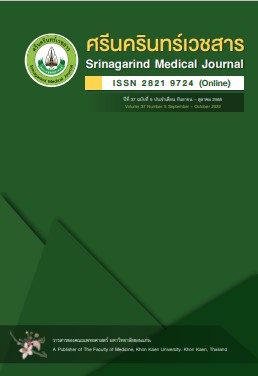Translation and Reliability Testing of the Instrument Satisfaction with Palliative Care for Patients with End-of-Life Dementia
Keywords:
translation methodology, the satisfaction with palliative care thai version, end-of-life dementiaAbstract
Background and objective: This paper to describe translation and reliability of the Thai version of the Satisfaction with Palliative Care for Patients with End-of-Life Dementia (SWC-EOLD).
Methods: The authors use the back- translation technique and tested with a sample who can only speak Thai. The sample was recruited 30 caregiver of patient with late stage dementia in Muang District, Khon Kaen Province between January 1, 2020 - December 31, 2020. Results: The results revealed that Thai version is the equivalence to the language content and semantic to the original version. Chrobach alphas of Thai version is 0.711 and each dimension range from 0.644 - 0.742 at a significant level .05
Conclusion: The questionnaire is reliable and applicable to the sample population.
References
www.who. [Cited June 28, 2022]. Available from https://www.who.int/news-room/fact-sheets/detail/dementia#:~:text=behaviour%2C%20or%20motivation.,Dementia%20results%20from%20a%20variety%20of%20diseases%20and%20injuries%20that,dependency%20among%20older%20people%20worldwide.
Institute for population and social research. populations, Mahidol University, Bangkok: Mahidol University. Ltd.Printmaking, 2011.
Institute for population and social research Mahidol university. report on the situation of the elderly in Thailand 2015. Bangkok: Amarin Printing and Publishing Company, 2016.
Alzheimer Association. Greater illinois chapter. encouraging comfort care a guide for families of people with dementia living in care facilities [Internet]. Alzheimer Association - Greater Illinois Chapter. [cited Dec 2, 2015]. Available from:http://www.alzheimers illinois.org/pti/downloads /Encouraging%20Comfort %20Care_SINGLE.pdf, 2010.
McCarthy M, Addington-Hall J, Altmann D. The experience of dying with dementia: A retrospective study. Int J Geriatr Psychiatry 1997;12 (3):404–9.
Mitchell S, Teno J, Kiely D, Schafer M, Jones R, Prigerson H. The clinical course of advanced dementia. N Engl J Med 2010;361:1529–38.
Covinsky KE, Goldman L, Cook EF, Oye R, Desbiens N, Reding D, et al. The impact of serious illness on patients' families. SUPPORT Investigators. Study to Understand Prognoses and Preferences for Outcomes and Risks of Treatment. JAMA 1994;272(23)):1839-44.
Thato S. Instrument translation. Journal of Nursing Science Chulalongkorn University2006, 18(2): 1-9.
Volicer L, Hurley AC, Blasi ZV. Scales for evaluation of end-of-life care in dementia. Alzheimer Dis Asoc Disord 2001;15:194-200.
Karunruk palliative care center statistics srinagarind hospital. annual report of the karunruk palliative care center statistics. Srinagarind Hospital, Faculty of Medicine, Khon Kaen University, 2018.
Srisatitnarakun B. Development and quality inspection of research instruments : quantitative measurement properties Psychology. Bangkok: The Printing of Chulalongkorn University, 2012.
Sunsern R, Rattanagreethakul S, Lawang L, Tassanatanachai A, Viriya C, Sorujthamakul T, et al. Evidence, problems, and healthcareneeds for hypertensionpatientsat Baan-bung District, Chon-Buri province. J Nurs Edu 2011;4(1):2-16.
Downloads
Published
How to Cite
Issue
Section
License
Copyright (c) 2022 Srinagarind Medical Journal

This work is licensed under a Creative Commons Attribution-NonCommercial-NoDerivatives 4.0 International License.




